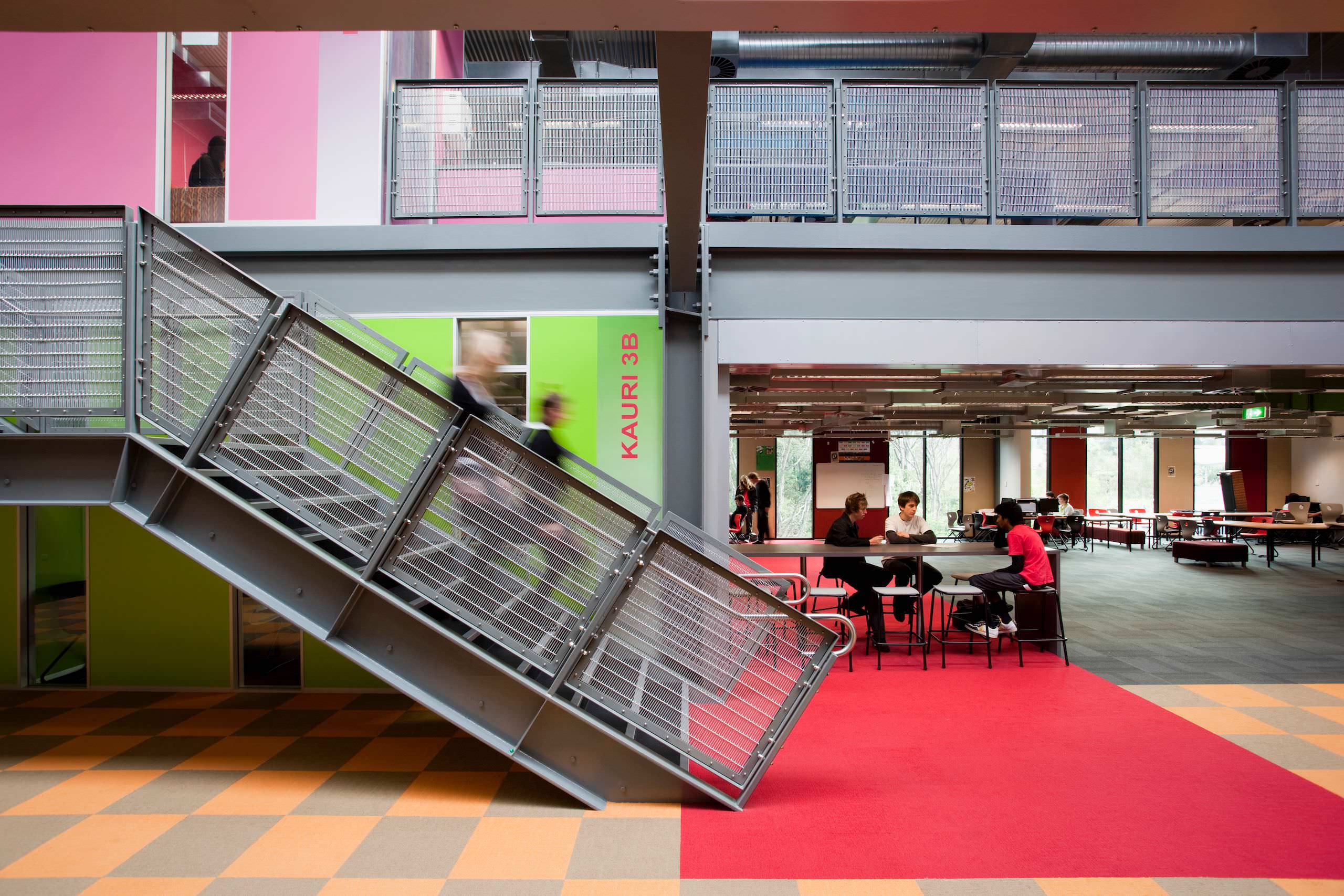Albany Senior High School – 31/10/2019
On this page:
- School Context
- Evaluation Findings
- Equity and excellence – achievement of valued outcomes for students
- School conditions for equity and excellence – processes and practices
- Board Assurance on Legal Requirements
- ERO’s Overall Judgement
- Going forward
- About the school
School Context
Albany Senior High School is a large suburban school that provides education for nearly 800 students in Years 11 to 13. The roll (which is growing) comprises a small proportion of Māori and Pacific students. The school recently celebrated its 10th year anniversary.
The school’s vision is to “Nurture, Inspire, Empower” students to achieve highly and be good citizens. The school aims to be future-focused and innovative, providing students with learning that is visible, deep and inclusive. The vision and aims are aptly captured in the school’s words, “It’s not if you are bright, it’s how you are bright”.
Students benefit from learning in purpose-built learning environments that are innovative and well designed.
Albany Senior High School’s achievement targets focus on increasing the quality of achievement through improved endorsed certificates in the National Certificate in Educational Achievement (NCEA).
In 2018, a new principal was appointed. There is also a new board of trustees governing the school comprised of both new and experienced members.
Leaders and teachers regularly report to the board schoolwide information about outcomes for students in the following areas:
- NCEA achievement for all students and groups of students (Māori, Pacific, students with additional needs)
- achievement in impact projects
- progress and achievement against school targets
- outcomes for engagement/wellbeing
- destination data for students leaving school.
The school is a member of the Kāhui Ako | Community of Learning (COL) – Whānau ki te Ako. Its Achievement Challenge targets include improvement in NCEA Levels 1-3.
Evaluation Findings
1 Equity and excellence – achievement of valued outcomes for students
1.1 How well is the school achieving equitable and excellent outcomes for all its students?
Teachers have a relentless focus on achieving equitable and excellent outcomes for all students. Most students achieve NCEA at the relevant year level. In 2018 there were high levels of achievement in NCEA literacy and mathematics with endorsements. School data indicate an increasing number of students are on track to achieve NCEA and endorsements in 2019.
A number of Māori students achieve merit and excellence endorsements in NCEA.
It is evident that the valued outcomes of the school, including competencies such as self-management, communication, collaboration and problem solving, are achieved by many students.
The school’s emphasis on inclusion promotes a learning culture that scaffolds and supports student success. Established strategies that successfully support equity within the school include:
- early identification of students with additional needs
- close monitoring of students’ achievement
- differentiating and adapting the curriculum
- flexible assessment processes
- collaboration with parents/whānau.
1.2 How well is the school accelerating learning for those Māori and other students who need this?
There is increasing parity for Māori and Pacific students in NCEA achievement, particularly in endorsements when compared to the non-Maori cohort.
School data indicate good evidence of accelerated learning progress for some students.
Acceleration of learning is well supported by school conditions that focus on effective learning through:
- a student-centred, responsive curriculum that encourages student leadership and agency
- an increasingly culturally responsive curriculum that promotes te ao Māori
- an inclusive and supportive school culture
- recognition of the importance of valued learning outcomes such as social skills, critical thinking and creativity.
2 School conditions for equity and excellence – processes and practices
2.1 What school processes and practices are effective in enabling achievement of equity and excellence, and acceleration of learning?
The school processes and practices that effectively promote and support equity and excellence include a responsive curriculum, strong educational leadership, collaboration and professional capability building, and focused and strategic evaluation and decision-making.
Students experience a rich, broad and relevant curriculum that challenges their critical thinking and creativity. The school’s integrated approach to learning means that the curriculum is connected and coherent and promotes students’ depth of learning.
The curriculum is inclusive and designed to inspire and empower students. Students experience interactive learning in class and through Impact Projects, Education Outside the Classroom (EOTC) and work experience.
There are frequent opportunities for students to develop leadership and grow their social skills, particularly communication and collaboration. Students have a direct and positive influence on shaping the school’s curriculum and learning environments.
A key feature of the curriculum is the focus on personalised project learning. These projects create authentic and relevant learning opportunities which challenge and build students’ deep learning, lateral thinking and problem solving. Student-centred learning with significant student agency and choice, leverages off student interest nurturing their engagement in learning.
Students and the local community benefit from learning that often has an expectation of social relevance, action and connection. Students frequently achieve valued outcomes that promote lifelong learning and attitudes of responsibility, altruism, and persistence. Because they take responsibility for their learning, students also experience good opportunities to develop self-management skills, confidence and resilience.
The curriculum is becoming increasingly culturally responsive with kapa haka, powhiri and te reo Māori. Students are also encouraged to pursue Māori learning contexts in impact projects where relevant.
School leadership is highly effective in promoting and enacting the school’s vision to nurture, inspire and empower students. Leaders are strongly committed to equity, excellence and inclusion. They build relational trust with students, teachers and the community, and promote leadership that is distributed and collaborative. They are continuing to build teacher and middle leader capability.
Some school leaders are influential leaders in national and learning area networks driving improvement in curriculum design and review. Coherent organisational structures and systems also promote a strong belief in students’ potential to grow through leadership. Students are encouraged to contribute and be involved as leaders.
Teachers work in open and collaborative ways that promote reflection and drive improvement in teaching both schoolwide and within learning areas. Teachers are committed to developing professionally and are open to learning and willing to innovate to improve students’ success. Appraisal processes support teachers’ reflection, responsiveness and adaptative practices well. Opportunities for teachers to undertake further professional learning and educational leadership are well supported by management and the board of trustees.
Internal evaluation is multi-layered and promotes reflection and responsive improvement in key areas of the school’s operations and curriculum. The board and school leaders’ decisions are well informed, strategic and considered. Well-coordinated and coherent systems and processes mean that decisions can be implemented flexibly and innovatively to support students and create a positive culture of learning.
2.2 What further developments are needed in school processes and practices for achievement of equity and excellence, and acceleration of learning?
Senior leaders have identified relevant areas for further school improvement. They will:
- enhance and enrich students’ access to, challenge and engagement in learning to promote achievement
- continue growing the effectiveness of middle leadership to guide and support innovation for student success.
Provision for international students
The school is a signatory to the Education (Pastoral Care of International Students) Code of Practice 2016 (the Code) established under section 238F of the Education Act 1989. The school has attested that it complies with all aspects of the Code.
At the time of this review there were 20 international students attending the school.
International students are integrated well into the school community. They benefit from high quality pastoral care and education. Their progress and achievement are well monitored and reported to the board of trustees.
3 Board Assurance on Legal Requirements
Before the review, the board and principal of the school completed the ERO board assurance statement and self-audit checklists. In these documents they attested that they had taken all reasonable steps to meet their legislative obligations related to the following:
- board administration
- curriculum
- management of health, safety and welfare
- personnel management
- finance
- asset management.
During the review, ERO checked the following items because they have a potentially high impact on student safety and wellbeing:
- emotional safety of students (including prevention of bullying and sexual harassment)
- physical safety of students
- teacher registration and certification
- processes for appointing staff
- stand down, suspension, expulsion and exclusion of students
- attendance
- school policies in relation to meeting the requirements of the Children’s Act 2014.
4 ERO’s Overall Judgement
On the basis of the findings of this review, ERO’s overall evaluation judgement of Albany Senior High School’s performance in achieving valued outcomes for its students is: Strong.
ERO’s Framework: Overall School Performance is available on ERO’s website.
5 Going forward
Key strengths of the school
For sustained improvement and future learner success, the school can draw on existing strengths in:
- a responsive and dynamic curriculum
- strong, distributed and collaborative leadership
- a professionally capable and committed teaching staff and culture.
Next steps
For sustained improvement and future learner success, priorities for further development are in continuing to:
- enhance and enrich students’ access to, challenge and engagement in learning to promote achievement
- grow the effectiveness of middle leadership to guide and support innovation for student success.
Steve Tanner
Director Review and Improvement Services Northern
Northern Region
31 October 2019
About the school
| Location | Albany, Auckland |
| Ministry of Education profile number | 563 |
| School type | Secondary (Years 11-15) |
| School roll | 863 |
| Gender composition | Girls 54% Boys 46% |
| Ethnic composition | Māori 4% NZ European/Pākehā 65% South African 10% Korean 7% Chinese 10% other ethnic groups 4% |
| Students with Ongoing Resourcing Funding (ORS) | Yes |
| Provision of Māori medium education | No |
| Review team on site | August 2019 |
| Date of this report | 31 October 2019 |
| Most recent ERO report(s) | Education Review December 2014 Education Review August 2011 |




